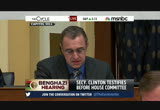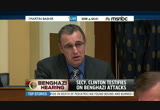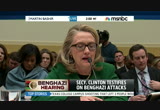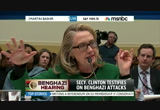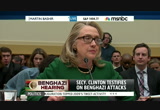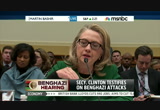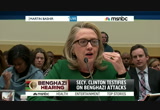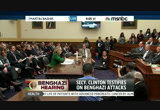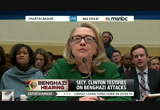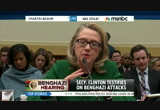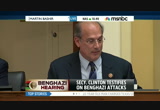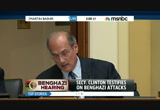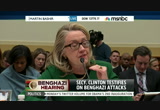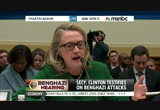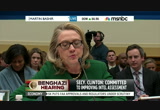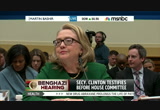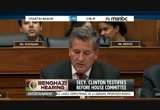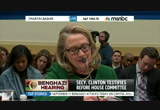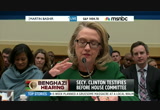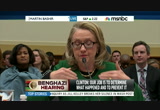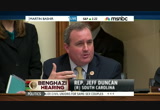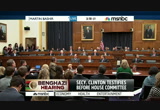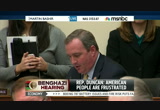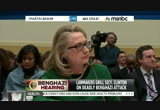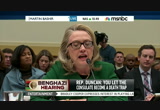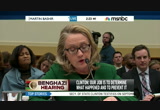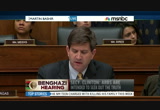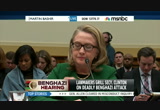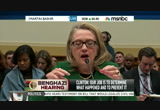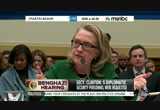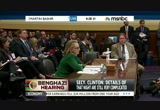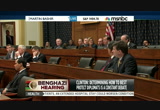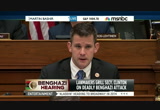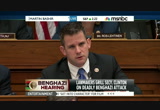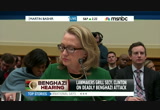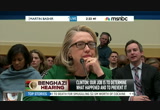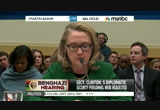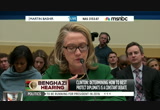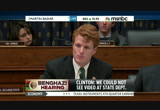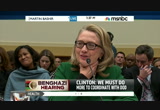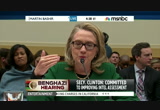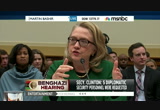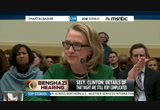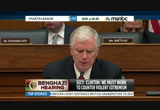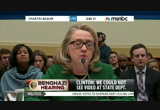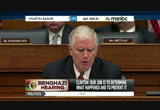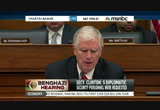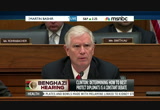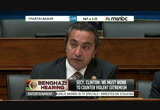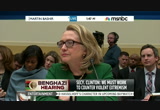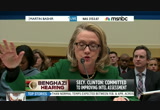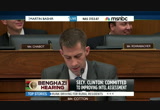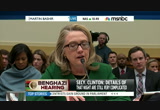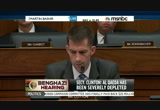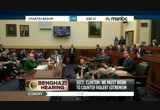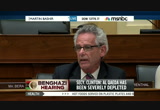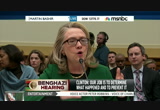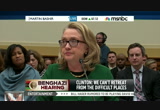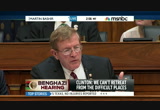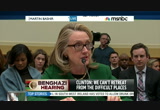tv Martin Bashir MSNBC January 23, 2013 1:00pm-2:00pm PST
1:00 pm
and the -- did not identify any above the assistant secretary level as accountable for the security failures at the benghazi mission. now, you've said that the numerous cables requesting and begging for additional resources sent by ambassador chris stevens were never seen by state officials above assistant secretary eric boswell or deputy assistant secretary charlene lamb. i know you care very deeply about the people that work with you in the department. so given the fact that your testimony is that you never saw any of these multiple requests and nobody above assistant secretary level saw these requests, doesn't that give you some concerns about the flow of information within the department? and maybe some of your ability to prioritize and get to your attention serious issues. you said that you get hundreds of thousands of cables all the time. and these cables directly to
1:01 pm
you. i understand that you don't read them all nor do you have the time to do that. but i would think that within the department, you would have peebl who worked for you who are able to prioritize and get to you the ones that are more serious in nature. and especially when somebody's security is on the line. finally, president truman had a placard on his desk that said this buck stops here. i know you've taken responsibility and i applaud you for that, but i really hope this isn't just an exercise -- another exercise in finding lower level bureaucrats to throw under the bus and actually get somewhere with this. not a game of got ya but how we can fix this for the future. i yield back and would love your answers. >> congressman, that's exactly what i'm intent on doing. and i think the arb, not i, has made its findings. the reason arbs were created was to take a dispassionate,
1:02 pm
independent view of what happened and then come up with recommendations that are the responsibility of the department to implement. you know, the arb makes very clear that chris stevens who probably knew more about libya than anybody else in our government did not see a direct threat of an attack of this nature and scale despite the overall trend of security problems that we faced. and i have to add, neither did the intelligence community. the arb makes that very clear. that the intelligence community also did not really zero in on the connection between the deteriorating threat environment in eastern libya and in benghazi. and a direct threat on our compound. so we have work to do. we have work to do inside the department. we have work to do with our
1:03 pm
partners and the d.o.d. and the intelligence community to constantly be taking in information, making sure it does get to the right people, that it isn't somehow stove piped or stalled. but that it does rise to decision makers. and i'm committed to improving every way that i can on what the arb told us to do on assessing our intelligence. and i think it's fair to say, congressman, that we have to do this now because i predict we're going to be as we saw in algeria seeing all kinds of asymmetric threats. not just to our government facilities but private sector facilities. in tunisia although we protected our embassy, our school was badly damaged. so we have to take a broader view. and i think that the arb gives us a start, but it's not the whole story. >> mr. grayson from florida. >> thank you, mr. chairman.
1:04 pm
and thank you very much, secretary clinton, for your contributions to securing america's place in the world for the past four years and for your contributions towards world peace. the first question i'd like to ask you has to do with the accountability review report. the report does identify specifically people who were found to have endangered in the department in systemic failures and inefficiencies. i want to be clear. you were not one of those people, is that correct? >> that's correct. >> now, it was identified a report dating from the 1990s had said that the secretary should take a personal and active role in security. have you done that during your four years at the state department? >> i have been very attuned to the environment in which threats are occurring, the intelligence that is available. certainly not the specific requests and decision making which rests with the security professionals.
1:05 pm
>> all right. regarding the security professionals, is there anybody now in existence in the department who is responsible for reviewing the itineraries of ambassadors in advance as to whether there is a threat to safety? >> the general answer to that is no. ambassadors are given what's called chief admission authority. ambassadors especially those we ask to go to dangerous posts are pretty independent folks. some of them might say what do you think about this or that? but most of them make their own decisions. chris stevens did not ask anyone for permission to go to benghazi. i don't think it would have crossed his mind. robert ford who served as our ambassador to syria went out on numerous occasions before we pulled him out of damascus.
1:06 pm
ryan crocker one of our very best who would be very difficult to say you can't do this even though you've decide you should do it. but what we're trying to do is to create a more ongoing discussion between our ambassadors who are our regional experts and our security people. so that at the very least, no ambassador is taking an unnecessary risk. however that is defined. >> with regard to ambassador stevens, certainly it was brave of him to go to benghazi on the days he did. i have to ask you honestly, though, was there anything in his itinerary on the 10th or 11th that actually specifically required his personal presence? >> well, he certainly thought so, congressman. and he did of course discuss this with his own security people. remember, we do have regional security officers in these posts. they are the ones that an ambassador will turn to.
1:07 pm
he believed that it was important for him to go to benghazi. there were a number of meetings that he was holding. and some public events that he had on his schedule. and, you know, he was someone who really believed strongly he had to get out there. and i think as the arb has pointed out, he was given great deference by the rest of the government. >> do you have any concept of the number of american troops it might have taken to actually create a totally secure environment for him in benghazi on september 10th and 11th? >> no. the number of diplomatic security people requested in the cables were five. there were five there that night with him. plus there was a mutual understanding with the annex that had a much more heavily
1:08 pm
armed presence because of the work that they were doing in the region. it is very difficult to in retrospect really anticipate what might have been. one of the rsos who had served in libya said the kind of attack that the compound suffered had not been anticipated. we had gotten used to, you know, preparing for car bombs and suicide bombers and things like that. but this was of a different nature. and we even saw at the annex which was much more heavily fortified, had much more heavy military equipment, we lost two of our best and had one of our diplomatic security officers badly injured. he's still at walter reed. so even the annex which had more assets in the face of the attack was suffering losses that night. >> thank you very much.
1:09 pm
>> mr. moreno of pennsylvania. >> good afternoon, madam secretary. in august of 2012 prior to the benghazi attack, the liberian congress published a report called al qaeda a libya pro file. this outlined the al qaeda presence in libya. something was especially alarming to me in this d.o.d. report was the mention that siriya and other groups have adopted the black flag promoted by al qaeda senior leaders. in my hand i hold a picture of the flag that the department of state identified to be a prominent issuance of this flag on the rise in libya. i also hold a picture of the
1:10 pm
same type of flag in tunisia where the protesters were outside the embassy there. in addition i have a flag -- picture taken in cairo at the u.s. embassy where demonstrations took place. another picture in jordan at the u.s. embassy where protests took place. in bahrain over 2000 protesters who burned numerous u.s. and israeli flags again at the embassy. in kuwait chanting obama we are all osama. the flag again. and in libya, the flag was carried through the streets there as well. my question, madam secretary, is were you aware of this d.o.d. report prior to the terrorist attack in benghazi? >> well, i was certainly aware
1:11 pm
of a number of reports from throughout our government. i don't know of the specific one you're referring to. there were d.o.d. reports, community reports, state department reports talking about the decreasing -- or the increasing threat environment in eastern libya. that is what we were trying to establish with the libyans. the election in july brought to victory what we would consider moderates. people who had a very different view of the kind of future than certainly al qaeda or these militants have. but there's going to be a struggle in this region and the united states has to be as effective in partnering with the non-jihadists whether they fly a black flag or any other flag. >> i clearly understand that,
1:12 pm
however, this flag was pointed out to be affiliated with al qaeda, terrorists who attack and kill united states citizens and other individuals around the world. do you -- did anyone in your department below you, were they aware of this report and these photos prior to? and don't you think they should have brought this to your attention? >> well, what i'm trying to say, congressman, is i am well aware that there were people claiming to be associated with al qaeda that were attempting to influence militias, attempting to exercise more authority along with a number of other groups that didn't necessarily work under that flag but had the same militant jihadist mentality. so yes, i was aware of that. and so was chris stevens and so was our team in libya. >> but my point is this flag kept coming up and you do not think that that was important enough to increase security when
1:13 pm
after how many embassies where this flag was shown in demonstrations. i personally think it would demand an increase in security. and those below you that might have known this should have brought that to your attention. i come from industry. i come from the government. and there are individuals that just have to be cut loose when they're not performing their tasks. are these three people on leave, are they still being paid? >> they are on administrative leave and under federal law and regulations they are still being paid. >> what's the hold up? >> because there are regulations and law that has to be followed. >> what's the hold up from a management perspective in saying you three let me down, this should have been brought to my attention. i no longer need your services? >> well, congressman i'd be happy to give you an answer because personnel discussions are not appropriate for public settings, but we have taken every step that was available. and we will continue to do so. and we are looking for additional authority. but to just finish up on the
1:14 pm
point you made. we had good security at all of those embassies other than in tunisia because of the newness of the government. and then when a they were asked to respond, they did. i go back to the point that was made on the other side of the aisle. we are dependent on host government support. and where it doesn't exist unless we invade and unless we have a big military presence in a country, we are doing the best we can with our diplomatic security and private security guards and any other help we can get. >> mr. vargas of california. >> thank you very much, mr. chairman, for the opportunity. and thank you very much, madam secretary for being here. i also want to thank you for the excellent work that you've done not only here in the united states but across the world. i have to say that because it's true, one. and secondly i don't think that my wife, my 16-year-old daughter, or my 9-year-old daughter she'd probably even turn on me, wouldn't let me in
1:15 pm
the house if i didn't say that. you are a hero to many, especially women, and you seem to bring out these deep aspirations that they have in ways i've never seen anyone do before. so again, thank you for your service. when i was reading the information here, it brought back to mind another assassination murder. i spent some time in el salvador. in 1989 there was an assassination of father ignacio aquira, father ignacio baronne, father juan moreno, father ramando lopez and a housekeeper mrs. alva ramos and her daughter. i knew them because i worked with them. and i know the pain that i felt when i heard they died.
1:16 pm
i had left by then. so i know that as you being the superior of the people who died i'm sure felt the same way. that's why i am glad that we brought up the names here today. i think it is important to mention the names. ambassador christopher stevens. mr. shawn smith. mr. tyrone woods. mr. glen dougherty. many of us believe they didn't die in vain. that's why i'm proud you're here bravely standing before us trying to figure out what to do. one of the things that troubled me on this is the reliance we have on local security. that's the part that didn't make sense to me. i come from san diego. we have the marine corps there, we have the navy. we have incredibly good security in service people. why don't we rely more on them? >> well, that's an excellent question. and you brought back back some sad memories talking about the
1:17 pm
losses that occurred in el salvador. we do rely primarily on host nation support, but we have to take a harder look at the commitment and the capacity of the host nations. and therefore in places all over the world, we also have private security guards. some armed, some unarmed. we have marine guards at many places, about 150, who at least are demonstrating a line of defense. but we have to do more. and when you ask why do we rely on these, well, in part because we don't have military assets everywhere. if you look at the statements particularly by ad mirl mullen he said we said we have to work together but it's unrealistic in his words to tether our military
1:18 pm
to every high-risk post. part of what we're trying to struggle through with is how do we make our facilities as secure as possible. because our diplomats are not soldiers. how do we have reliability security. the february 17th bring kad was a libyan militia that started defending chris stevens when he showed up before gadhafi fell. they had been reliable. they had been responsive. but they were not particularly available during those first minutes and hours of the attack on our compound. we also had contracted with a private security company that had a permit to operate in libya. the united states, unless we go into a country with massive military force, we go in and we follow the rules of the country. and we had to get a security force that had a permit from the
1:19 pm
libyan government. these are all issues being looked at as we try to fill the gaps. >> and the last thing i would correct you said earlier we haven't done enough promoting ourself around the world. i think you have. and i think you've done a fantastic job. other than president kennedy, i don't know if anyone who's had a better image in the latin america. so we thank you. >> thank you very much, congressman. >> we go now to mr. duncan of south carolina. >> thank you, mr. chairman. americans are frustrated. they're frustrated over the handling of benghazi. what happened when four americans died there. they're frustrated. and sometimes they're down right angry about being what they think being misled about what really happened there. being told that this was a protest over a video not just far couple days, but for weeks on end. then they're frustrated when they see comments from you this morning when you said what difference at this point does it make.
1:20 pm
i'll tell you what difference it makes. it makes a difference when americans think they were misled about something for political reasons. in hearing this morning you mentioned that we were clear eyed about the threats and dangers as they were developing in eastern libya. madam secretary, if you were really clear eyed about the levels of threat to our consulate in benghazi or our special mission in benghazi, then you should have known about chris stevens' memo of 16 august that said the consulate could not be defended from a coordinated attack. questions americans have is did he expect an attack? if you were clear eyed, then why didn't your -- why did your department reject the request i believe on 7 june for 16 additional security agents. a security team that would have been funded by d.o.d.
1:21 pm
not state expenditure. shouldn't you have known there was no one to turn to security assistance? you answered that earlier when you said you were unsure about the libyan government and their ability to provide that assistance. were you clear eyed about the al qaeda displeasure with whom we seemed to be supporting during the summer elections? the moderate that was elected. if you were clear eyed shouldn't you have known that al qaeda roamed freely in and around benghazi? as my friend from pennsylvania pointed out, there were al qaeda flags not just at the protests. there were al qaeda flags flying all over benghazi. if you were clear eyed, were you clear eyed when the brits left benghazi because of they had the attack? why did four americans die? what was so important that ambassador stevens if he knew there was a security threat in benghazi, he went there on september 10th and 11th and gave his life for our country. what was so important for him to
1:22 pm
go to eastern libya knowing all these threats, knowing the memos are clear, and i think you misspoke earlier when you said requests were denied for more security. when he requested for one msd team or an additional msd team and the replay from john said unfortunately msd cannot support the request. there was a request made for more security. and it was denied on june 7th. and so madam secretary, the consulate became a death trap. that's malpractice. you said you take responsibility. what does responsibility mean, madam secretary? you're still in your job and there are four people at the department of state that have culpability in this that are still in their jobs. i heard the answer about firing or removing personnel.
1:23 pm
i get that, but this was gross negligence. at one point in time can our administration and our government fire someone whose gross negligence left four americans dead in benghazi? what does the word responsibility mean to you, madam secretary? >> i think i've made that very clear, congressman. and let me say that we've come here and made a very open transparent presentation. i did not have to declassify the arb. i could have joined 18 of the other arbs under both democratic and republican administrations, kept it classified and just said good-bye. that's not who i am. that's not what i do. and i have great confidence that the accountability review board did the job they were asked to do. made the recommendations that they thought were based on evidence. not on emotion. -- >> there was a lot of evidence.
1:24 pm
there was a lot of evidence that led up to this security situation. you mentioned transparency. you haven't provided the call logs of messages, instant messages during the attack between the post and operation center. where you release these communications. >> i will get an answer to you on that, but i will tell you once more the reason we have accountability review boards is to that we take out of politics, we take out emotion what happened. and we try to get to the truth. i think this very distinguished panel did just that. and we are working diligently over time to implement their recommendations. that is my responsibility. i'm going to do everything i can before i finish my tenure. and i would also -- going back to your first point about the concerns that people you represented have expressed about statements that were made.
1:25 pm
i would refer you both to the unclassified version of the arb where after months of research and talking to more than a hundred witnesses, the picture is still very complicated about what happened that night. there are key questions, i'm quoting, surrounding the identity, actions, and motivations of the perpetrators that remain to be determined and i recommend that every member read the classified version which goes into greater detail that i cannot speak to here today. >> it was a terrorist attack. it's pretty clear what the motivation was. >> mr. schneider. >> madam secretary, let me again thank you for joining us. thank you for opening up the arb report. we are grateful. let me also echo the words of my colleagues and extend my personal gratitude for your service. you made our people proud. you've done an extraordinary job as our nation's top diplomat and you'll be sorely missed. the benghazi attack claimed the lives of four americans
1:26 pm
including ambassador chris stevens who had done so much to liberate the libyan people. despite the risk involved, he returned to that country as our ambassador because he knew the important work of building a new libya remained unfinished. america's diplomatic corps knowingly put themselves in danger to help the country. we must do more to spoerpt our diplomats. i am pleased you have stated you will accept every one of the 29 review board's recommendations. the state department is increasingly operating in high-threat locations throughout the world. requiring our diplomats to be stationed closer to dangers on the ground. this not only raises the security risks by our diplomats but also places a strain on existing resources. as we move forward, how will the state department evaluate the benefits to u.s. interests from
1:27 pm
having an official presence in a given location versus the security risks faced by that diplomatic mission? how do you think the department will weigh the personnel and costs opposed to the gains of operating in front line states. and what changes do you think these demands will require? vis-a-vis people and other resources at the state department. >> those are very important questions and i can't do justice to them in the time left. but we'll get you additional written information. let me briefly say, congressman, that i ordered the first ever diplomacy and development review. because i said i served on the armed services committee where we get every four years a quadrenial plans for authorization. i wanted to lay the groundwork for us to do the same with the state department. in that document we began what
1:28 pm
is a very difficult analysis about how to balance and mitigate risk versus presence. it was part of the -- it was one of the most challenging aspects of the qddr. and we have an ongoing effort underway. because if you talk to many of our ambassadors especially the experienced ones, they really don't want to be told by washington or anybody where they can go, when they can go, what they can do. they've been in the foreign service 10, 20, 30 years or more and they believe in their missions and they believe they have a better sense of how to evaluate risk. at the same time we do have to be conscious of and make difficult decisions about how to protect not just ambassadors but all of our personnel and their families in these high-risk posts. it is a constant debate, congressman. you know, we have authorized departure. we have ordered departure.
1:29 pm
and it is something we take seriously when we do it. you know, when we left benghazi on the night of 11th, 12th there were others still there. the italians were there. the turks were there. people evaluate risk over time. and i think it's important to do what we can to minimize it. some of that will be done by technology. some of that will be done by hard security. and some of that will be done by what we call soft power. trying to get the balance right is very difficult. >> as we look forward to steps taken, how do we ensure we'll be in new places how are we going to make sure we provide to the posts? >> very difficult. you know, that's going to be a question of new streamlined processes and protocols.
1:30 pm
security both hard and soft. and resources. and we just have to ask you based on our best assessment about what we need to do our jobs. and sometimes, you know, you've got a budget process and nobody has predicted you're going to have a revolution against gadhafi. then you have to scramble. how do you figure out what to do in tripoli? and i could go down the line and tell you 10 or 20 of those examples we live with every day. so we -- it's more of an art than a science, to be honest. because as of now we don't have hard parameters. but we're trying to develop the best we can. >> thank you. >> madam secretary, i understand that you have a meeting at the white house but have agreed to stay so that members can have a few more questions. we will end by 5:00 and we really appreciate that. we want to go to mr. kissinger
1:31 pm
of illinois. >> thank you for staying. i really appreciate it. i appreciate your service to your country. and, you know, we -- as was mentioned earlier we look forward to your next steps. we'll see what happens. let me just say i'm actually an air force pilot and i have a few concerns i want to lay out here. one of the first things i was told as a pilot in the military is that your country will never leave you behind. if you find yourself down in enemy lines rest assured your country will move heaven and earth to come get you. if you're in armed conflict, rest assured your country will do everything to save you. as a representative of the administration i have to ask you this. from the initial attack to the second attack, there was a lull of seven hours. i'm going to say this. i was one of a handful of republicans to vote to support the president's position in libya. i think we did the right thing there. but i did it with the knowledge we would have the military forces in place to rescue any personnel in a tough situation. in that intervening seven hours,
1:32 pm
military assets to what we know, what we can talk about were not put in place. the air base is 1,044 miles from benghazi. it's an f-16 base. airplanes could have been put in the air if they were fueled. and there could be non-viability things f-16s can do to disperse crowds that i know of well. that's a concern also. originally when you briefed us and i remember -- this has been hammered a little bit -- but when you briefed us you said unequivocally this was the result of the video. you got upset about it when someone suggested this was a terrorist attack. this was in our briefing we had. but we find out now it wasn't the video. it was a terrorist attack. when we come talk about the issue of the drone and the surveillance overhead, if there was in fact a drone overhead, i would assume that there would be a link in which you could watch what is going on live or else
1:33 pm
maybe somebody you should you was able to see what was going on live or else that link was down. and another question i have, when it comes to -- i watched your testimony in the senate and you said part of the reason we had a bit of a delay in understanding what was going on, we did not have immediate access in the security cameras, the security footage. yet at the same time you had mortars being reported as being fired on security personnel. if i would hear that mortars are being fired, i would immediately assume regardless of whether i could see what's going on overhead, regardless if i could see the security footage, that this is more than a spontaneous demonstration. the other question i have -- i'm laying a few out for you. the foreign response team. was that your decision not to deploy that? e wr does that come from? and i want to say this. again as a believer as we are in a time where it is important for
1:34 pm
american leadership to be out in front, to prevent a resurgence of jihadist activity, al qaeda activity, i'm worried about the strategy of leading from behind. if the united states ambassador in libya and i say this respectfully, can't get a message forward to the secretary of state about his concern about security in one of the most hot zones in the world, i worry about a lead from behind strategy. and if we have no assets on alert that can respond in a seven-hour lull in two different attacks in the most hot spot -- one of the most hot spots in the world, on 9/11, on the anniversary. is a lead from behind strategy failing because i really believe we're the people that are going to be able to take freedom around the globe. with that, i'll give you the
1:35 pm
remaining minute and i thank you for your generosity. >> i thank you for your service both in the air force and here. there was a lot packed into that. let's see what else i can cover quickly and get the rest to you in writing. d.o. dmplt took every action it could take from the time secretary panetta and dempsey to do so. again, i turn to the arb because that to me is a much more factually based finding. the board found no evidence of any undue delays in decision making or denial of support from washington or from military combatant commanders. quite the contrary. the safe evacuation of all u.s. personnel from benghazi 12 hours a the attack was the result of exceptional u.s. government coordination and military response and helped save the lives of two severely wounded americans. now, having said that, i think it's very important we do more
1:36 pm
to coordinate with d.o.d. along the lines of what you're talking about. because who knows what's going to be facing us in the thex months and years. with respect to the video, i did not say that it was video -- that it was about the video for libya. it certainly was for many of the other places where we were watching these disturbances. now, respect to predator feed or video of the attack, we could not see that at the state department. there was no access to that at no time did i have a live feed of the attack. not from any system in our compound. and not from the annex, nor from any uav. there's been confusion understandably because we did talk about the surveillance camera video that eventually got to us. i will give you more information about that, because i think it is important to understand how this happened. and as you know, congressman,
1:37 pm
the annex was not under our -- my authority. so information was flowing into another agency, more than one other agency. and those people were incredibly brave by overwhelmed as well. >> mr. kennedy of massachusetts. >> thank you, mr. chairman. mr. ranking member and madam secretary, thank you for what i can only describe as a truly exemplary career. i look forward to the future for you. i have two broad based questions for you if i can, madam secretary. you now have held this office for four years in an extraordinarily challenging time in our history. we're seeing we've recently passed the two year anniversary of the arab awakeni awakening. spreading out through the middle east. and iran, pakistan, afghanistan.
1:38 pm
as you close on your tenure, i was wondering if you might be willing to share some important lessons learned from the time you spent in this post. and enlighten us as to what congress can do to help respond and even get in front of these threats as we move forward. and related to that if i may, assuming that you're going to say what you've said a couple of times about increased engagement at the ground level, how do we do that in areas that are unstable? where we need to depend on local governments or local security forces that we've frankly seen don't have the ability to provide the type of security that our diplomats are going to demand. >> well, congressman, it's wonderful to see you here. and i thank you for your interest in looking sort of into the future. let me just make a couple of
1:39 pm
points. first, we have a lot of tools we don't use as well as we should. i think we've abdicated the broadcasting arena where both in tv and radio which are considered kind of old fashioned media are still very important in a lot of these difficult places where we're trying to do business. and i think we have to to get our act together. i would taupe that this committee would pay attention to the broadcasting board of governors which is in desperate need of assistance intervention and change. i think social media is a great tool. we've begun trying to use it much more in the state department and not to communicate with just leaders and officials but really as you say get down into the grassroots. we have also -- i started two
1:40 pm
organizations to deal with counter extremism. one a new department inside the state department that is staffed with inner agency experts. so i'm not saying anything that's classified, but it's beginning to try to respond to al qaeda and other jihadist propaganda. so if they put up a video which talks about how terrible americans are, we put up a video which talks about how terrible they are. we're trying to meet them in the media channels that they are communicating with people. we're also at the beginning of an organization i helped to stand up the global counterterrorism forum. because if we don't work with partners and understand more effectively how to counterviolent extremism, how to stop recruiters, how to turn families and communities against these jihadists, there will be a constant flow of them. we have to be smarter about that. there are things i would like to share with you and others who
1:41 pm
are interested. it's not a perfect analogy, but i would say that our fight against international communism, against soviet union during the cold war, we did a lot of things really well. i mean, we kept people's hopes alive. we communicated with freedom lovers and advocates behind the iron curtain. we did it through media. we did it through our values. well, i think we've got a similar challenge even though it's a very different world. and let's get smart about it. and let's figure out how we're going to put some points on the board, so to speak, in deals with governments and populations. i know representative duncan is left, but his question took me a little by surprise because our opt center does not do instant messages. the reason you have not got instant messaging is we do not do instant messaging. i hope his staff will convey that to him. thank you.
1:42 pm
>> thank you. we go to mr. brooks of alabama. >> thank you mr. chairman. secretary clinton, i want to thank you for time you've spent with us and the senate for that matter. i'm sure it's been a long day. it's been any experience that truth without credibility is meaningless and credibility once lost is difficult to acquire. have damaged america's credibility here and also abroad. i don't focus on any of your statements in that regard. rather i focus on some others. on september 16th, 2012, on "meet the press" ambassador susan rice stated and i quote, what happened in benghazi was initially a spontaneous reaction to what had transpired before in cairo. almost a copy cat of the demonstrations against our facility in cairo which were prompted, of course, by the video. end quote. let me break this statement down into three parts, if i might.
1:43 pm
i'd ask you to confirm based on the data we now have whether her comments were true or false. secretary clinton, is ambassador's statement that benghazi was a spontaneous reaction to the cairo protest factually accurate? >> well, i think if you look at the arb finding, congressman, there is still question about what caused it. so i don't want to mislead you in any way. that is not the weight of the evidence right now, but i think until the fbi completes its investigation, we're not going to know all the reasons why these people showed up with weapons and stormed our compound. >> well, secretary clinton, is ambassador rice's statement that benghazi was a copy cat of the cairo demonstrations factually accurate? >> well, it turned out nod not to be because the cairo demonstrations were not heavily armed. and we did get host nation security support. so there were differences.
1:44 pm
but again, i would say that secretary rice conveyed information that had been provided by the intelligence community. >> i'm not trying to go into the process. right now i'm just trying to determine what the truth is best we know at this time. is ambassador rice's statement that benghazi was of course prompted by an anti-muslim video in the united states. >> i'd have to go back to my first statement and say we don't know all of the motivations so i don't want to give a sweeping answer to what caused these men to come out that night and attack the compound. >> all right. well, on september 16th, the same day you and susan rice made her statements to the american people in the world, said quote, the idea this cowardly act was a spontaneous act is completely unfounded and preposterous.
1:45 pm
we firmly believe that this was a precalculated, preplanned attack that was carried out specifically to attack the united states consulate. end quote. as we now know from everything i have read at least, the libyan president told the truth. contrast that with the statements by ambassador rice to the united nations. it forces one to wonder whether libya's intelligence was that much better than america's on september the 16th or whether libyan leaders were that much more willing to be candid or to avoid misstatements. secretary clinton, what evidence was there that was so compelling that it caused the white house through ambassador susan rice to make these representations about spontaneous protests, anti-muslim videos and the like despite statements of libyan's president to the contrary. where was the compelling evidence and what was it?
1:46 pm
>> well, congressman, i was not involved in the so-called talking points process. my understanding is it was a typical process trying to get to the best information available. it was an intelligence product. they are as i again understand it working with their committees of jurisdiction to try to unpack that, but i will say that all of the senior administration officials including ambassador rice who spoke publicly to this terrible incident had the same information from the intelligence community. >> if i might interject. i appreciate your response so far, but if you're not familiar with any compelling evidence that would back the statements of susan rice, who would know? >> well, there was evidence. and the evidence was being sifted and analyzed by the intelligence community. which is why the intelligence community was the principal
1:47 pm
decider about what went into talking points. and there was also the added problem of nobody wanting to say things that would undermine the investigation. so it was much more complex than i think we're giving it credit for, sir. >> thank you for your candor and for your time. >> the ranking member and i have discussed going to three minutes per question from here on out. without objection, that's what we will do. let's go to mr. berra from california. >> secretary clinton, thank you for appearing before the committee today. as a new member of congress, i think i speak for all the freshmen that we're not going to get much time to serve with you but we hope in a few years we'll get that chance to serve again. you know, from my perspective, the tragedy in benghazi was the loss of four american patriots nap loss was felt pretty deeply in northern california particularly around ambassador chris stevens. you know, his family had deep roots in our community. the best way for us to honor their memory and their service
1:48 pm
so to do our utmost to make sure the lessons of benghazi and do everything we can to honor and protect our men and women around the world. you know, in an increasingly dangerous situation. you've before forthright today and forthcoming with information that we truly appreciate. much has been made today about the flow of information. but i want to quote former chairman of the joint chiefs of staff admiral mike mullen who said after the arb was issued as someone who's run large organizations and the secretary of state has been very clear about taking responsibility here, it was from my perspective not reasonable in terms of having a specific level of knowledge that was very specifically resident in her staff and over time certainly didn't bring that to her attention. that was admiral mike mullen. secretary, how many cables did
1:49 pm
you say arrive every year to the state department? 1.4 million? can you tell me how long it takes you to read 1.4 million cables. >> well, if i ever tried to read 1.4 million cables, i don't think i'd be sitting here today. i think i'd be collapsed somewhere. you know, i appreciated what admiral mullen said. when you do sit on top of large organizations in his case the united states military which is huge. and in my case the state department and usaid. you put into place processes. and you have to trust the judgment, the good sense of the people in your organization. so those 1.43 million cables, they come into the state department. you know, the tradition is they're all addressed to me. but the vast, vast majority are funneled through these processes to get to the right people who are expected to take the right actions. and 99.9% of the time, people
1:50 pm
do. i want to reiterate that. it's an incredible organization with dedicated people particularly our security professionals who have stopped so many attacks, protected so many people. but occasionally we see a serious problem like we have seen here. and that's what we're trying to fix. >> well, thank you for your candor. >> thank you, sir. >> mr. tom cotton of arkansas. >> good afternoon, madam secretary. thank you for coming. we're all here happy to have you here and your recovery. bring greetings from our mutual friends in arkansas. some peers on the other side have expressed their ambitions for your future. i would like to say i wish you'd won the democratic primary in 2008. >> i did pretty well in arkansas. >> you did. you said on september 21st that we will not rest until we have tracked down and brought to justice the terrorist who murdered the four americans at benghazi. >> yes, sir.
1:51 pm
>> earlier today you said you hope the fbi will hold them responsible. do the differences change your thought. >> congratulations and great to see you here. no, it does not. i am conscious is something you have to be extremely careful about for ovb reasons. i think it's clear or i hope it's clear that president obama when he says we're going to bring people to justice even if it takes some time, he mean what is he says. obviously the fbi is conducting an investigation. what actions are taken will be determined in the future. >> what is the united states government's position on the role of al qaeda in the islamic and attacks in benghazi? >> again, i'm not going to prejudge what the fbi determines. we know there are al qaeda-related organizations as we saw from the pictures that were held up throughout the region including in eastern
1:52 pm
libya. we know people like we saw with the recent attacks in a.m. jeer ya like to associate themselves with al qaeda. but we've got to be careful about what that means. core al qaeda has been severely depleted coming out of afghanistan and pakistan. what we're dealing with now is the jihadists who have been associated with al qaeda who have gained, unfortunately, very serious combat experience. coming back to the countries that they left in order to go wage jihad in central asia. so whether they call themselves al qaeda or haram, or sharia. they are all part of the same global jihadist movement. and there may be differences between them, but their goals are unfortunately similar and pose threats to us and our partners. >> both the chairman and mr. poe have referenced a tunisian suspect who has been released that was reported in "the new
1:53 pm
york times." do you find it distressing that the government released that gentleman in light of the hundreds of millions of dollars of aid we have given them other the years? >> i do not. first, i had a long conversation with high-ranking tunisian officials about this. as did director muller when he was there in person. we have been assured that there was an effort to have rule of law, judicial process, sufficient evidence not yet available to be presented. but a very clear commitment made to us that they will be monitoring the whereabouts of harsai and we're going to hold them to that. >> thank you. >> mr. lowenfal. >> thank you. first of all, i want to compliment you on your service. but i really want to say how much i appreciated your
1:54 pm
openness, your thoughtfulness today. your transparency. what i'm struck with in this hearing is a greater thought of the personnel. we are left with that understanding of just how courageous the personnel have been in taking on assignments that in the past never have been taken on before. and you've ably i think presented to us why that is important. why it's important for emerging democracies that we be there. my question is very similar to the one of congressman schneider's. and that was how do you make that analysis between risk and presence? what are some of the obstacles in makes that? how do we move guard with that? >> well, this is my ongoing hope
1:55 pm
that we can get it more right than wrong. let me just make a few points because it's an issue i hope this committee takes very seriously. first of all you've got to know when we talk about the state department and diplomatic facilities, that covers -- we are the umbrella for so many other agencies in our government. if we were not there, many of those agencies representatives would have a difficult time being there. i mean, we are the diplomatic presence that permits us to pursue law enforcement objectives, intelligence objectives, military objectives, and so much more. so it's not just about us sitting around and saying you know, do we really want our diplomats at risk? it's okay, what are the equities of the rest of the government that would be asktsed if we decided we had to close shop
1:56 pm
because the risk was too great. i want to stress that because i don't think you can understand at least from my perspective how difficult the calculation is without knows it's not just about the state department and usaid. secondly, i don't think we can retreat from these hard places. we have to harden our security presence, but we can't retreat. we've got to be there. we've got to be picking up intelligence, information, building relationships. and if we had a whole table of some of our most experienced ambassadors sitting here today, they would be speaking with a loud chorus. yes, help us be secure, but don't shut us down. don't keep us behind high walls, in bunkers so we can't get out and figure out what's going on. so that's the balance i've been trying to make for four years. >> we will only have time for two more questions. we will end at five. we'll now go to mr. cook from california. >> thank you, madam secretary.
1:57 pm
first of all, i want to compliment you. it's been a long, long day. and to survive all these questions and everything, it's been tough. i want to talk to you about the marine security guards. >> yes. >> and this is from somebody who spent a long time in the marine corps. but not under the cognizance part of d.o.d., not under the state department. you had some things in here about additional marine secure -- excuse me. a marine security guard detachments. >> yes, sir. >> and the question is about whether it's prudent to task organize those assets that are organic to you and perhaps put them in those areas that have the high threat level. and if you could answer that, i'd appreciate that. >> congressman, it's a very
1:58 pm
astute observation. i mean, we believe that we need to increase both our marine security guard detachments as well as our diplomatic security and create more synergy and cooperation in these high-threat posts. the marine security guards as you know are very much a presence on more than 150 of our posts. and in order give them the facilities and support they need, they need a marine house. they need to be very close to the embassy. because as -- if you saw the recent movie "argo," you saw the marines in there destroying the classified material when the mob was outside in tehran. they are experts at that. they are people that are totally relied on by the entire mission.
1:59 pm
but as i said earlier, historically their job has not been personal security. so we've got to figure out working with d.o.d. and particularly with the marines, and most of them are very young. i take pictures with them everywhere i go. usually the sergeants are older, more experienced. but most of the marines on duty are quite young. we've got to figure out how we really take advantage of their presence. and that's a conversation we're in the midst of with our d.o.d. colleagues. and with your experience, i would welcome any insight or ideas you've got about how we really do use a marine security detachments better. >> thank you very much. i yield my time. >> thank you. we'll go to grace ming from new york. >> congratulations, too, grace. >> thank you. thank you, mr. chairman, mr. ranking member. madam secretary,
140 Views
IN COLLECTIONS
MSNBC West Television Archive
Television Archive  Television Archive News Search Service
Television Archive News Search Service 
Uploaded by TV Archive on

 Live Music Archive
Live Music Archive Librivox Free Audio
Librivox Free Audio Metropolitan Museum
Metropolitan Museum Cleveland Museum of Art
Cleveland Museum of Art Internet Arcade
Internet Arcade Console Living Room
Console Living Room Books to Borrow
Books to Borrow Open Library
Open Library TV News
TV News Understanding 9/11
Understanding 9/11